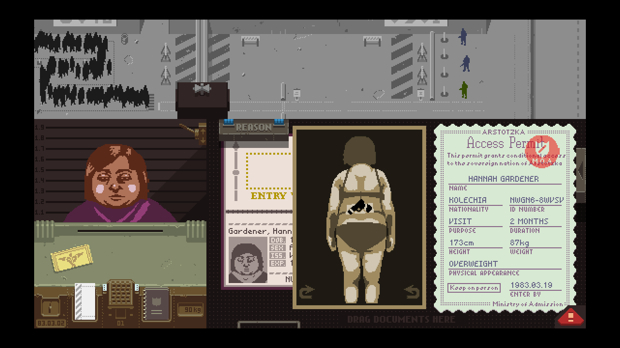 Back to selection
Back to selection
Game Engine
by Heather Chaplin
Gaming the System
 Papers, Please
Papers, Please Like their counterparts in film and music, game designers love a good award show. This year the International Games Festival awards were swept by a game that had critics raving all year and will surely go down in history as the first game to make suspense and heartache out of pushing papers and cross-checking documents.
Lucas Pope, who left blockbuster studio Naughty Dog to go it alone, calls Papers, Please, his first commercially released game, a “dystopian document thriller.” On first glance, documents may seem like an odd center for a thriller of any kind, but then again in this age of data collection and surveillance, maybe Pope is right on target.
Certainly critics in 2013 thought so. Not only did the game press flip over Papers, Please, but also reviewers at such highbrow institutions as The New Yorker and the BBC raved. Sam Machkovech, writing for Ars Technica, said, “Buy, study, and share this game as an example of video games as true art.”
It’s 1982 in Papers, Please. The location is the make-believe country Arstotzka, which has just finished a six-year war with neighboring country Kolechia. You are an immigration officer, a job you won through the “labor lottery,” which requires you to approve or deny people’s entry from Kolechia into Arstotzka. At the end of every day (six minutes in game time), you tally up your salary – you get money for every correct decision and fined for incorrect ones – and see how your family is faring in terms of rent, heat and medical expenses.
The game is rendered in intentionally low-resolution graphics – it’s 1982, after all – along with drab colors and highly unflattering images of the people passing through. Heavy, vaguely Slavic-sounding music plays. Your screen is split into three parts, with little black shapes of people waiting to move through security at the top of the screen, a first-person view of people approaching the counter to the left, and then a desk where people’s identification papers appear on your right. You drag and drop passports, your rulebook and other items across the desk. The game mechanics are essentially a puzzle game, where you have to match up Arstotzka’s ever-changing requirements with what passes your desk.
The game feels, however, like much more than that.
It starts simply enough. You have your rulebook, which has maps, pictures of different passports and document seals. You also have a government memo instructing you to make sure immigrants’ passports are legitimate. You check people’s photos, match the face in front of you and verify that nothing is out of date.
As the game progresses, however, your choices — and their effects — become increasingly complicated. People tell you their stories. There’s the woman who is desperate to see her son, but whose papers are out of date. There’s a man who has proper papers but whose wife doesn’t; she says she will be killed if she goes back to her own country. There are human traffickers who want to bribe you, and there’s a shadowy anti-government organization called EZIC, which wants you to help bring down the regime.
And at the end of every day, there’s your own family. Let too many people in without the proper papers, and you’ll be fined. Be fined too often, and you won’t be able to afford heat. Leave the heat off too often, and your children get sick. People stay sick for too long and they die.
In addition, every day that you play, the security rules issued by the government become more complicated. The complications are tied to the game’s narrative, which unfolds in newspaper headlines at the beginning of every day; the paper tells the story of an increasingly repressive regime. Every choice becomes fraught. As your own family’s narrative progresses, your caring for them deepens. But this happens at the same time as your sympathy for the people around you also deepens. How can it not as the horror stories mount, and the political situation becomes increasingly authoritarian? “Soon every choice became maddening,” wrote Steve Mullis for National Public Radio. “Sending someone away who was fleeing their country or possibly being trafficked wracked me with guilt.”
Colin Campbell, writing for Polygon, took it even further: “It’s one thing to talk about the banality of evil when it comes to faceless bureaucracy, but it’s quite another when the player is asked to become a cog in that machine.”
Papers, Please certainly seems like part of the trend of games as commentary, or even the sub-genre of games that force you to feel implicated — think Molleindustria’s way-ahead-of-its-time McDonald’s Videogame (2006), where you have to run McDonald’s (from pleasing shareholders to breeding cattle in cleared rain forests) or the more recent Sweatshop HD, where you manage a sweatshop, and which caused a tsunami of controversy in the game world when the Apple store refused to sell it.
Indeed, across the board, critics waxed deep about Papers, Please as political commentary. But — and here’s the interesting thing — Pope himself says that it wasn’t his intention to be political. The game was not meant as an attack on the U.S.’s response to 9/11 or on former Soviet Union strong-arm policies. Rather, it was inspired by the “difficulties of being an immigration officer.” In a YouTube interview with digital game store Steam, Pope said he wanted to “put a fun mechanic with a fun story.” He said he was really interested in the game “as entertainment.”
But perhaps it was that very lack of intent that makes this game about the life of a “cog” so successful. Instead of a simple, one-sided message, the game reveals the complexity of a troubled system. It’s a funny thing about art — that it can surpass what the maker intended.
